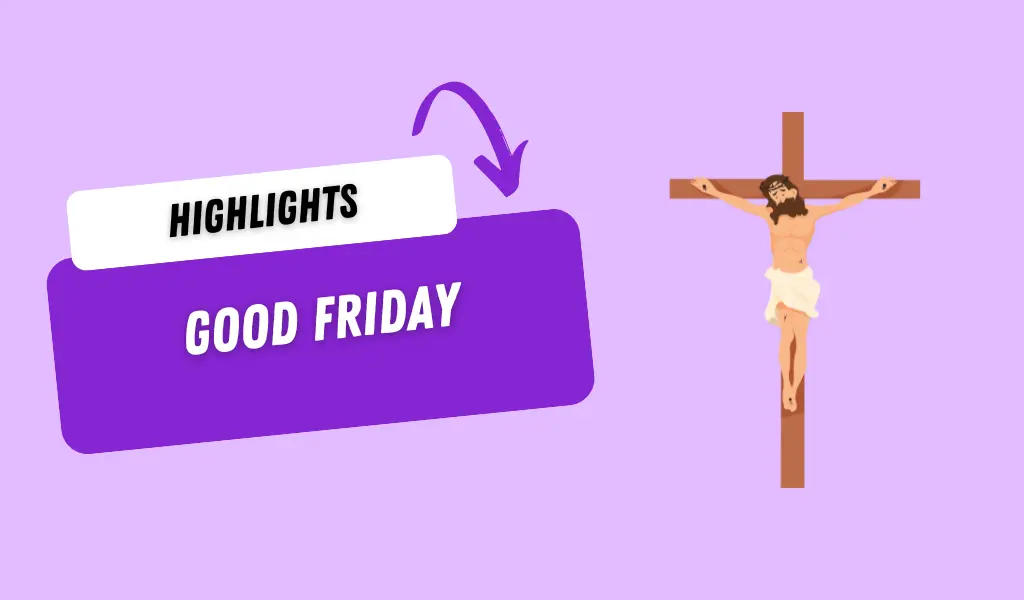Good Friday
29th March 2024 (Friday)
Psalter: Week 2
Reading of the Day
First Reading: Isaiah 52:13-53:12
Behold, my servant shall act wisely; he shall be high and lifted up, and shall be exalted. As many were astonished at you—his appearance was so marred, beyond human semblance, and his form beyond that of the children of mankind—so shall he sprinkle many nations. Kings shall shut their mouths because of him, for that which has not been told them they see, and that which they have not heard they understand. Who has believed what he has heard from us? And to whom has the arm of the Lord been revealed? For he grew up before him like a young plant, and like a root out of dry ground; he had no form or majesty that we should look at him, and no beauty that we should desire him. He was despised and rejected by men, a man of sorrows and acquainted with grief; and as one from whom men hide their faces he was despised, and we esteemed him not. Surely he has borne our griefs and carried our sorrows; yet we esteemed him stricken, smitten by God, and afflicted. But he was pierced for our transgressions; he was crushed for our iniquities; upon him was the chastisement that brought us peace, and with his wounds we are healed. All we like sheep have gone astray; we have turned — every one — to his own way; and the Lord has laid on him the iniquity of us all. He was oppressed, and he was afflicted, yet he opened not his mouth; like a lamb that is led to the slaughter, and like a sheep that before its shearers is silent, so he opened not his mouth. By oppression and judgment he was taken away; and as for his generation, who considered that he was cut off out of the land of the living, stricken for the transgression of my people? And they made his grave with the wicked and with a rich man in his death, although he had done no violence, and there was no deceit in his mouth. Yet it was the will of the Lord to crush him; he has put him to grief; when his soul makes an offering for guilt, he shall see his offspring; he shall prolong his days; the will of the Lord shall prosper in his hand. Out of the anguish of his soul he shall see and be satisfied; by his knowledge shall the righteous one, my servant, make many to be accounted righteous, and he shall bear their iniquities. Therefore I will divide him a portion with the many, and he shall divide the spoil with the strong, because he poured out his soul to death and was numbered with the transgressors; yet he bore the sin of many, and makes intercession for the transgressors.
Psalm 31:2 and 6, 12-13, 15-16, 17 and 25 (R. Luke 23:46b)
R/. Father, into your hands I commend my spirit!
Second Reading: Hebrews 4:14-16; 5:7-9
Brethren: Since we have a great high priest who has passed through the heavens, Jesus, the Son of God, let us hold fast our confession. For we do not have a high priest who is unable to sympathize with our weaknesses, but one who in every respect has been tempted as we are, yet without sin. Let us then with confidence draw near to the throne of grace, that we may receive mercy and find grace to help in time of need. In the days of his flesh, Jesus offered up prayers and supplications, with loud cries and tears, to him who was able to save him from death, and he was heard because of his reverence. Although he was a son, he learned obedience through what he suffered. And being made perfect, he became the source of eternal salvation to all who obey him.
Verse Before The Gospel
V/. Glory and praise to you, O Christ
R/. Glory and praise to you, O Christ
V/.A new commandment I give to you, says the Lord, that you love one another: just as I have loved you.
R/. Glory and praise to you, O Christ.
Gospel : John 18:1-19:42
Please download the pdf for Passion Reading
When Jesus had spoken these words, he went out with his disciples across the brook Kidron, where there was a garden, which he and his disciples entered. Now Judas, who betrayed him, also knew the place, for Jesus often met there with his disciples. So Judas, having procured a band of soldiers and some officers from the chief priests and the Pharisees, went there with lanterns and torches and weapons. Then Jesus, knowing all that would happen to him, came forward and said to them, “Whom do you seek?” They answered him, “Jesus of Nazareth.” Jesus said to them, “I am he.” Judas, who betrayed him, was standing with them. When Jesus said to them, “I am he,” they drew back and fell to the ground. So he asked them again, “Whom do you seek?” And they said, “Jesus of Nazareth.” Jesus answered, “I told you that I am he. So, if you seek me, let these men go.” This was to fulfill the word that he had spoken: “Of those whom you gave me I have lost not one.” Then Simon Peter, having a sword, drew it and struck the high priest’s servant and cut off his right ear. (The servant’s name was Malchus.) So Jesus said to Peter, “Put your sword into its sheath; shall I not drink the cup that the Father has given me?”So the band of soldiers and their captain and the officers of the Jews arrested Jesus and bound him. First they led him to Annas, for he was the father-in-law of Caiaphas, who was high priest that year. It was Caiaphas who had advised the Jews that it would be expedient that one man should die for the people.Simon Peter followed Jesus, and so did another disciple. Since that disciple was known to the high priest, he entered with Jesus into the courtyard of the high priest, but Peter stood outside at the door. So the other disciple, who was known to the high priest, went out and spoke to the servant girl who kept watch at the door, and brought Peter in. The servant girl at the door said to Peter, “You also are not one of this man’s disciples, are you?” He said, “I am not.” Now the servants and officers had made a charcoal fire, because it was cold, and they were standing and warming themselves. Peter also was with them, standing and warming himself.The high priest then questioned Jesus about his disciples and his teaching. Jesus answered him, “I have spoken openly to the world. I have always taught in synagogues and in the temple, where all Jews come together. I have said nothing in secret. Why do you ask me? Ask those who have heard me what I said to them; they know what I said.” When he had said these things, one of the officers standing by struck Jesus with his hand, saying, “Is that how you answer the high priest?” Jesus answered him, “If what I said is wrong, bear witness about the wrong; but if what I said is right, why do you strike me?” Annas then sent him bound to Caiaphas the high priest.Now Simon Peter was standing and warming himself. So they said to him, “You also are not one of his disciples, are you?” He denied it and said, “I am not.” One of the servants of the high priest, a relative of the man whose ear Peter had cut off, asked, “Did I not see you in the garden with him?” Peter again denied it, and at once a rooster crowed.Then they led Jesus from the house of Caiaphas to the governor’s headquarters. It was early morning. They themselves did not enter the governor’s headquarters, so that they would not be defiled, but could eat the Passover. So Pilate went outside to them and said, “What accusation do you bring against this man?” They answered him, “If this man were not doing evil, we would not have delivered him over to you.” Pilate said to them, “Take him yourselves and judge him by your own law.” The Jews said to him, “It is not lawful for us to put anyone to death.” This was to fulfill the word that Jesus had spoken to show by what kind of death he was going to die.So Pilate entered his headquarters again and called Jesus and said to him, “Are you the King of the Jews?” Jesus answered, “Do you say this of your own accord, or did others say it to you about me?” Pilate answered, “Am I a Jew? Your own nation and the chief priests have delivered you over to me. What have you done?” Jesus answered, “My kingdom is not of this world. If my kingdom were of this world, my servants would have been fighting, that I might not be delivered over to the Jews. But my kingdom is not from the world.” Then Pilate said to him, “So you are a king?” Jesus answered, “You say that I am a king. For this purpose I was born and for this purpose I have come into the world—to bear witness to the truth. Everyone who is of the truth listens to my voice.” Pilate said to him, “What is truth?”After he had said this, he went back outside to the Jews and told them, “I find no guilt in him. But you have a custom that I should release one man for you at the Passover. So do you want me to release to you the King of the Jews?” They cried out again, “Not this man, but Barabbas!” Now Barabbas was a robber.Then Pilate took Jesus and flogged him. And the soldiers twisted together a crown of thorns and put it on his head and arrayed him in a purple robe. They came up to him, saying, “Hail, King of the Jews!” and struck him with their hands. Pilate went out again and said to them, “See, I am bringing him out to you that you may know that I find no guilt in him.” So Jesus came out, wearing the crown of thorns and the purple robe. Pilate said to them, “Behold the man!” When the chief priests and the officers saw him, they cried out, “Crucify him, crucify him!” Pilate said to them, “Take him yourselves and crucify him, for I find no guilt in him.” The Jews answered him, “We have a law, and according to that law he ought to die because he has made himself the Son of God.” When Pilate heard this statement, he was even more afraid. He entered his headquarters again and said to Jesus, “Where are you from?” But Jesus gave him no answer. So Pilate said to him, “You will not speak to me? Do you not know that I have authority to release you and authority to crucify you?” Jesus answered him, “You would have no authority over me at all unless it had been given you from above. Therefore he who delivered me over to you has the greater sin.”From then on Pilate sought to release him, but the Jews cried out, “If you release this man, you are not Caesar’s friend. Everyone who makes himself a king opposes Caesar.” So when Pilate heard these words, he brought Jesus out and sat down on the judgment seat at a place called The Stone Pavement, and in Aramaic Gabbatha. Now it was the day of Preparation of the Passover. It was about the sixth hour. He said to the Jews, “Behold your King!” They cried out, “Away with him, away with him, crucify him!” Pilate said to them, “Shall I crucify your King?” The chief priests answered, “We have no king but Caesar.” So he delivered him over to them to be crucified.So they took Jesus, and he went out, bearing his own cross, to the place called The Place of a Skull, which in Aramaic is called Golgotha. There they crucified him, and with him two others, one on either side, and Jesus between them. Pilate also wrote an inscription and put it on the cross. It read, “Jesus of Nazareth, the King of the Jews.” Many of the Jews read this inscription, for the place where Jesus was crucified was near the city, and it was written in Aramaic, in Latin, and in Greek. So the chief priests of the Jews said to Pilate, “Do not write, ‘The King of the Jews,’ but rather, ‘This man said, I am King of the Jews.’” Pilate answered, “What I have written I have written.”When the soldiers had crucified Jesus, they took his garments and divided them into four parts, one part for each soldier; also his tunic. But the tunic was seamless, woven in one piece from top to bottom, so they said to one another, “Let us not tear it, but cast lots for it to see whose it shall be.” This was to fulfill the Scripture which says,“They divided my garments among them, and for my clothing they cast lots.”So the soldiers did these things, but standing by the cross of Jesus were his mother and his mother’s sister, Mary the wife of Clopas, and Mary Magdalene. When Jesus saw his mother and the disciple whom he loved standing nearby, he said to his mother, “Woman, behold, your son!” Then he said to the disciple, “Behold, your mother!” And from that hour the disciple took her to his own home.After this, Jesus, knowing that all was now finished, said (to fulfill the Scripture), “I thirst.” A jar full of sour wine stood there, so they put a sponge full of the sour wine on a hyssop branch and held it to his mouth. When Jesus had received the sour wine, he said, “It is finished,” and he bowed his head and gave up his spirit.Since it was the day of Preparation, and so that the bodies would not remain on the cross on the Sabbath (for that Sabbath was a high day), the Jews asked Pilate that their legs might be broken and that they might be taken away. So the soldiers came and broke the legs of the first, and of the other who had been crucified with him. But when they came to Jesus and saw that he was already dead, they did not break his legs. But one of the soldiers pierced his side with a spear, and at once there came out blood and water. He who saw it has borne witness—his testimony is true, and he knows that he is telling the truth—that you also may believe. For these things took place that the Scripture might be fulfilled: “Not one of his bones will be broken.” And again another Scripture says, “They will look on him whom they have pierced.”After these things Joseph of Arimathea, who was a disciple of Jesus, but secretly for fear of the Jews, asked Pilate that he might take away the body of Jesus, and Pilate gave him permission. So he came and took away his body. Nicodemus also, who earlier had come to Jesus by night, came bringing a mixture of myrrh and aloes, about seventy-five pounds in weight. So they took the body of Jesus and bound it in linen cloths with the spices, as is the burial custom of the Jews. Now in the place where he was crucified there was a garden, and in the garden a new tomb in which no one had yet been laid. So because of the Jewish day of Preparation, since the tomb was close at hand, they laid Jesus there.
Daily Gospel Reflection
Highlight: Good Friday
Guidelines: Jesus crucified on the Cross is the Epitome of Love. Cross, the Death-bed is the Spring of Life
1. If Maundy Thursday is the “Taste” of Love, Good Friday is the “Test” of love. Look at the cross, look at that Christ with wounds, with blood, without strength, falling and raising, bears the cross, hangs on it, and dies on it. Look at his suffering. What a pain! What a shame! What a disgrace! What a failure! What a defeat!
2. One who did many a miracle, now hanging on the cross, as a despicable debacle! One who cured many wounds, now all bruised by wounds all over! One who defended the oppressed now stands defenseless and oppressed by the weight of the cross! One who relieved many of their burdens now reels under the burden of the cross! One who fed the hungry now is left to starve! One who quenched the thirsty, now abandoned to cry, “I thirst!”, One who saved many, now stands damned, One who graced many is exposed disgraced!
3. But also think – Why all this? What wrong? What crime? What did he do to deserve such a heinous death penalty? The answer is Nothing. He is The Son of God, the Holy One, the Just One, with no sin, no guilt, no evil. He has always done good, and only good.
4. If so, then why this pain of the cross? Only one reason: It is love (John 3.16): God loved us so much, and for this reason gives his only Son as the ransom for the remission of our sins. True love does everything, everywhere, and always for the loved one. True love faces everything, endures everything, and sacrifices everything, for the sake of the beloved.
5. If not for that love why must he forsake all the glory and dignity of the heaven and embrace our human misery? Yes. Only for love for us, he shares our difficulties, sheds tears for us, and wipes away the tears of so many. Only in love and for love, does he accept everything and lowers his head in patience and abandonment, accepts unjust condemnation.
6. Even if received spits from those whom he gave a new dignity, Even if covered with wounds by those whom he healed of their wounds, Even if despised by those whom he has always treated with respect, Even if led on the path of Calvary, by those whom he has made walk on the way of salvation, Even if thrown down, by those whom he has lifted when fallen, Even if drained away of his strength, by those whom he has strengthened when weak, Even if abandoned as an orphan, by those whom he has transformed into heirs for grace, Even if hung on the cross like a criminal, the one who is the Most Holy, Even if subjected to death, the one who is the source and giver of life, by those who received life – even then, He does not react, does not attack, does not incriminate them.
7. All in love, and for love. He carries all our burdens on himself, on our behalf, in the place of us, he becomes the victim, he immolates himself. Like the grain of wheat, He allows himself to fall and die, so that In his death – we have life, In his poverty – we have the enrichment, in his misery – we have glory, in his blood – we have cleansing, in his isolation – we have our return, in his crucifixion – we have our resurrection, in his disfiguration – we have our transfiguration, in his deterioration – we have our restoration, in his annihilation – we have our regeneration!
8. This is the beauty and the greatness of the cross. It is not so much the fact of the cross, not so much the cruelty of suffering, but the sign of it, the significance of it, the reasons for it, and the effects of it, that are more important. It is not so much “what is seen”, but “what is behind” and “what is ahead” that glorifies and exalts the cross. God’s love and mercy are behind the cross, and forgiveness of sins, reconciliation with God, and salvation for eternity are ahead of the cross.
9. Thus, in the cross, what is exalted is not the piece of the cross, which is actually a means of a heinous penalisation for criminals. What is glorified is not hapless suffering. What is eternalised is not the helpless defeat of a just man at the hands of injustice and corruption of values. Cross is not a dead end of misery, but the threshold of glory. Cross is the greatest challenge and battle against human fragility and falsity.
10. Cross is the clearest testimony of God’s love, which shoulders our burden so as to relieve us, which empties itself so as to fill us with God’s abundant grace, and which dies so as to give us new life. Cross is that Breath of love: It is in love, God breathed His own life into us, He continued to breathe His love upon us all throughout his life, and in love, He breathed his last. He loved us to the end of His breath. Cross shows the heights to which true love, and that is God’s love in Jesus can reach up to. Cross testifies to what depths, the deepest love of God can stoop into.
11. Cross bearing the crucified, symbolises the conviction and commitment, courage and perseverance, love and sacrifice of Jesus to the end and without end. Cross is not a dark defeat, but a bright feat of immense love. Cross is not a sign of misery, but a reign of glory. Cross is not a mere ignominy or agony wreathed in suffering, but a symphony and epiphany of salvation, clothed in self-offering. Cross is the greatest testimony of God’s solidarity with the human predicament – God’s caring, sharing, and bearing to the extent of daring even death.
12. Cross with the crucified, is an Ignition of inspiration and urge, instilling courage and energy, to numberless souls who offer their life to God and suffer for God and good. Cross is also an ever-flowing spring of comfort and hope to all those simple and innocent hearts who seem to undergo unjust and undue suffering, so as to accept, bear, and move ahead in surrender and renewed strength
13. Today then, what does the cross mean to us? What does it tell us and call us for? It is not enough that we venerate the cross, kiss it, wear it or keep the crosses everywhere. Cross means much more than that. Cross means taking a stand for Christ, for his values, for the Gospel. Cross means standing for a cause. But the cross cannot be isolated from the Crucifix. Therefore Cross calls for a relationship, passion, intimacy, loyalty, and commitment to the Crucifix. It is about defending a cause, representing a person, a question of perseverance and loyalty. Cross means facing the consequences, and enduring suffering for the sake of Christ and his values.
14. In line with the holy bishop Fulton J. Sheen, the cross is a call to be vertical-oriented, heaven-oriented people. A cross is created when a horizontal bar is placed against a vertical bar. In other words, whenever our will is placed against the will of God, a cross is formed. Therefore, the cross constantly invokes us to put the will of God above and against self-will and self-interest.
15. In the light of the affirmation of Saint Paul, “Christ the Crucified is an obstacle for the Jews and a folly for the Gentiles, but for us, the believers, Christ is the Power and the Wisdom of God”, the cross becomes a call to be a “contrast” “people. We live in a world that is too permissive, where every false thing is allowed, justified, and even promoted, in the guise of modernity, change, and fashion and reading the signs of the times. Let us pray that we may be dead to sin, and alive to grace! Today let us impress this love within us. Let’s focus on this fire of passion and burn with the same.







